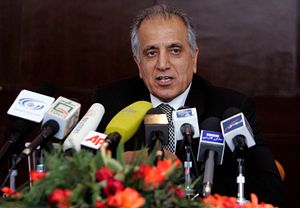It’s telling that the biggest news about the ongoing Afghan peace process is that negotiators have “agreed to agreements in principle” on some key issues. On Monday, following six days of talks in Qatar with Taliban representatives, U.S. envoy Zalmay Khalilzad said in a statement that progress on vital issues had been made and the two sides had “agreed to agreements in principle on a couple of very important issues.”
Khalilzad went on to acknowledge that more work needs to be done. According to the Associated Press, the statement continued: “There is a lot more work to be done before we can say we have succeeded in our efforts but I believe for the first time I can say that we have made significant progress.”
In an interview with the New York Times, Khalilzad said “We have a draft of the framework that has to be fleshed out before it becomes an agreement.” Back in Kabul as of Sunday, Khalilzad said,“The Taliban have committed, to our satisfaction, to do what is necessary that would prevent Afghanistan from ever becoming a platform for international terrorist groups or individuals.”
Khalilzad was named Special Representative for Afghanistan Reconciliation in September 2018 by U.S. Secretary of State Mike Pompeo. A former U.S. Ambassador to Afghanistan and also Iraq, Khalilzad was tasked with finding a peace settlement for the war in Afghanistan. Since, Khalilzad has engaged in significant shuttle diplomacy, bouncing around the Middle East and South Asia. In the last month alone, Khalilzad led a delegation to India, the United Arab Emirates, China, Afghanistan, and Pakistan before heading to Qatar and then Afghanistan again.
Reuters quoted a Qatari Foreign Ministry official in reporting that the two sides have “agreed tentatively to reconvene on February 25.”
An apparent draft of the deal, referenced by the New York Times and Reuters, reportedly contains provisions for a withdrawal of U.S. troops and a pledge by the Taliban to not allow Afghan soil to be used by others, presumably al-Qaeda and the Islamic State.
On Twitter, Khalilzad said meetings in Qatar were “more productive than they have been in the past. We made significant progress on vital issues.”
“[We] will build on the momentum and resume talks shortly,” he continued. “We have a number of issues left to work out. Nothing is agreed until everything is agreed, and ‘everything’ must include an intra-Afghan dialogue and comprehensive ceasefire.”
A Taliban official speaking to the New York Times didn’t comment on the issue of a ceasefire and direct talks between the Taliban and the Afghan government. These two issues are the most difficult to surmount. The Taliban has steadfastly refused direct talks with the Afghan government, casting the leaders in Kabul as American puppets. Meanwhile, fighting continues across Afghanistan with the Taliban enjoying influence over an estimated half of the country’s districts.
Back in Kabul for consultations, Khalilzad will continue to serve as a bridge between the Afghan government and the Taliban. For its part, the Afghan government led by President Ashraf Ghani continues to work with Khalilzad while trying to reassure the Afghan people that they will not be abandoned. As Tolonews reported it, on Monday Ghani gave a national address calling on the Taliban to enter direct talks, assuring “the people that their rights will not be compromised in the name of peace and that the country’s sovereignty will be upheld.”
On Monday in Kabul, Khalilzad told Afghan media that there is a “moment of opportunity for peace.”
“The key for finding the solutions for Afghan problems is at the hands of Afghans now,” he said.
It’s important to reiterate that nothing has actually been agreed to, not even the principles. The checklist to achieving peace is long, with each side having different priorities for what ought to come first. For the Taliban, a U.S. troop withdrawal is a top item; for the United States, a ceasefire would be among the top priorities but as hinted last month, the Trump administration is keen to drawdown troop levels too; and for the Afghan government, both a ceasefire and direct talks are near the top of the list, with the troop withdrawal much further down and contingent on security improvements that at this stage are far from realized.
The next iteration of talks for Khalilzad are reportedly set for late February.

































